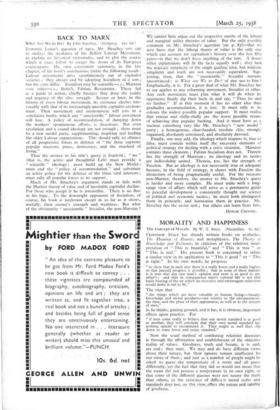BACK TO MARX
What Ara We to Do? By John Strachey. (Goltanc4. ups. 6d.)
ECHOING Lenin's question of 1902, ,Mr. Strachey 'sets out to analyse the weakness of the British Labour Movement, to explain its historical vicissitudes, and to plot the course which it must follow to escape the doom of its European counterparts. His own convenient summary, in the list chapter, of his book's conclusions, yields the following result : Labour movements arise spontaneously out of capitalist societies ; they always end by adopting Socialism 'of a sort ; but the sorts differ. Socialism may be scientific—i.e., Marxian —or other—i.e., British, Fabian, Revisionist. These fail as a guide to action, chiefly because they deny the reality and urgency of the class struggle. Sooner or later, in the history of every labour movement, its existence clashes irre- vocably with that of its increasingly unstable capitalist environ- ment. Then movement and environment will join in a conclusive battle, which any " unscientific " labour movement will lose. A policy of accommodation, of damping down the workers' spontaneous efforts, is disastrous. But even resolution and a sound ideology are not enough ;'there must be a new model party, supplementing, inspiring and leading the older Labour organisations. This should rally an alliance of all progressive forces in defence of " the three supreme popular interests, peace, democracy, and the standard of living."
Thus the answer to his title's query is fourfold ; " we " (that is, the active and thoughtful Left) must provide a " scientific " ideology ; must build up the New Model ; must end the " policy of accommodation " and substitute an active policy for the defence of the three vital interests ; must rally all popular forces to its support.
Much of Mr. Strachey's argument stands or falls with the Marxist theory of value and of inevitable capitalist decline. For those who accept it he is irresistible. There is no flaw in his logic. To the downright opponents of Socialism, of course, his book is irrelevant except in so far as it shows, usefully, their enemy's strength and weakness. But what of the obstinately " unscientific " Socialist, the non-Marxian ?
We cannot here ar=gue out the respective merits of the labour and marginal utility theories of value. But the only possible comment on Mr. Strachey's- apertion (on p. 133)that we now knOw that the labour theory of value is the only one which can account for capitalism's history over the last fifty -years—is that we don't know anything of the sort. A dozen other explanations will fit the facts equally well ; they lack the majestic simplicity of the single guiding idea, but majestic simplicity and truth are not necessarily equivalent. Sup- 'posing, then, that the " unscientific " Socialist remains unconvinced ; is What are We to Do ? of any use to him ? Emphatically, it is. Fcir a great deal of what Mr. Strachey has to say applies to any reforming movement, Socialist or other. Any such movement must plan what it will do when its opponents finally dig their heels in and say, " Thus far and no farther." If at that moment it has no other idea than gradualist accommodation, it is lost. It must rally to its colours the widest possible popular support. It must realise that retreat and shilly-shally are the worst possible means of achieving that popular backing. And it must have as a nucleus something very like Mr. Strachey's " new model " party ; a homogenous, clear-headed, resolute elite, strongly organised, absolutely convinced, and absolutely devoted.
Finally, one may add, the ideology which inspires it, true or false, must contain within itself the necessary elements of political strategy for dealing with a crisis situation. Marxism contains these elements ; Fabian Socialism does not. Therein lies the strength of Marxism ; its ideology and its tactics are indissolubly united. Therein, too, lies the strength of Fascism. But an ideology is not necessarily true or adequate because, in the field of strategy, it shares with Fascism the distinction of being pragmatically useful. For the recusant non-Marxist, therefore, the answer to Mr. Strachey's query is harder and more complex. He must unite with a long- range view of affairs which will serve as a permanent guide to peaceful development a consistently thought out science of political and economic tactics ; he must both distinguish them in principle, and harmonise them in practice. Mr. Strachey has the easier task ; but others can learn from him.
HONOR CROOME.










































































 Previous page
Previous page